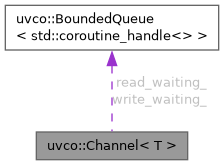#include <channel.h>

Classes | |
| struct | ChannelAwaiter_ |
Public Member Functions | |
| Channel (unsigned capacity, unsigned max_waiters=16) | |
| Create a channel for up to capacity items. | |
| template<typename U> | |
| Promise< void > | put (U value) |
| Promise< T > | get () |
| MultiPromise< T > | getAll () |
Private Member Functions | |
| void | awake_reader () |
| void | awake_writer () |
Private Attributes | |
| BoundedQueue< T > | queue_ |
| BoundedQueue< std::coroutine_handle<> > | read_waiting_ |
| BoundedQueue< std::coroutine_handle<> > | write_waiting_ |
Detailed Description
class uvco::Channel< T >
A Channel is similar to a Go channel: buffered, and blocking for reading and writing if empty/full respectively.
A bounded-capacity channel for items of type T. A channel can be waited on by at most max_waiters coroutines. If more coroutines want to wait, an exception is thrown.
A reader waits while the channel is empty, and is awoken by the first writer. A writer waits while the channel is full, and is awoken by the first reader.
When only using a channel to communicate small objects between coroutines, it takes about 50 ns to send a small value (e.g. int) on clang-21 and AMD Ryzen 7 PRO 7840U.
Caveat 1: the channel is obviously not thread safe. Only use within one loop.
Caveat 2: Channel is independent of a Loop. This means that runMain() may return despite there being channels in use and awaited on. Ensure that at least one uv operation (socket read/write/listen, timer, etc.) is running to keep the loop alive.
Constructor & Destructor Documentation
◆ Channel()
|
inlineexplicit |
Create a channel for up to capacity items.
Member Function Documentation
◆ awake_reader()
|
inlineprivate |
◆ awake_writer()
|
inlineprivate |
◆ get()
|
inline |
Take an item from the channel.
Suspends if no items are available. The suspended coroutine is resumed by the next writer adding an item.
◆ getAll()
|
inline |
Continuously read items from channel by repeatedly co_awaiting the returned MultiPromise. (getAll() is a generator)
Remember to call MultiPromise<T>::cancel() when you are done with the channel, although this should happen automatically when the last MultiPromise object is dropped.
◆ put()
Put an item into the channel.
Suspends if no space is available in the channel. The suspended coroutine is resumed by the next reader taking out an item.
Template method: implements perfect forwarding for both copy and move insertion.
The argument is only accepted by value, as it's safer to do so in a coroutine.
Member Data Documentation
◆ queue_
|
private |
◆ read_waiting_
|
private |
◆ write_waiting_
|
private |
The documentation for this class was generated from the following file:
- uvco/channel.h
Generated by